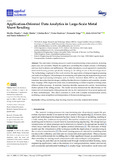Mostrar el registro sencillo del ítem
Application-oriented data analytics in large-scale metal sheet bending
| dc.creator | Penalva Oscoz, Mariluz | es_ES |
| dc.creator | Martín, Ander | es_ES |
| dc.creator | Ruiz, Cristina | es_ES |
| dc.creator | Martínez, Víctor | es_ES |
| dc.creator | Veiga Suárez, Fernando | es_ES |
| dc.creator | Gil del Val, Alain | es_ES |
| dc.creator | Ballesteros Egüés, Tomás | es_ES |
| dc.date.accessioned | 2024-01-18T15:34:56Z | |
| dc.date.available | 2024-01-18T15:34:56Z | |
| dc.date.issued | 2023 | |
| dc.identifier.citation | Penalva, M., Martín, A., Ruiz, C., Martínez, V., Veiga, F., Gil del Val, A., Ballesteros, T. (2023) Application-oriented data analytics in large-scale metal sheet bending. Applied Sciences, 13(24), 1-13. https://doi.org/10.3390/app132413187. | en |
| dc.identifier.issn | 2076-3417 | |
| dc.identifier.uri | https://hdl.handle.net/2454/47093 | |
| dc.description.abstract | The sheet-metal-forming process is crucial in manufacturing various products, including pipes, cans, and containers. Despite its significance, controlling this complex process is challenging and may lead to defects and inefficiencies. This study introduces a novel approach to monitor the sheet-metal-forming process, specifically focusing on the rolling of cans in the oil-and-gas sector. The methodology employed in this work involves the application of temporal-signal-processing and artificial-intelligence (AI) techniques for monitoring and optimizing the manufacturing process. Temporal-signal-processing techniques, such as Markov transition fields (MTFs), are utilized to transform time series data into images, enabling the identification of patterns and anomalies. synamic time warping (DTW) aligns time series data, accommodating variations in speed or timing across different rolling processes. K-medoids clustering identifies representative points, characterizing distinct phases of the rolling process. The results not only demonstrate the effectiveness of this framework in monitoring the rolling process but also lay the foundation for the practical application of these methodologies. This allows operators to work with a simpler characterization source, facilitating a more straightforward interpretation of the manufacturing process. | en |
| dc.description.sponsorship | The authors acknowledge the funding from the Horizon 2020 Research and Innovation Program of the European Union under grant agreement No. 958303. | en |
| dc.format.mimetype | application/pdf | en |
| dc.language.iso | eng | en |
| dc.publisher | MDPI | en |
| dc.relation.ispartof | Applied Sciences 2023, 13(24), 13187 | en |
| dc.rights | © 2023 by the authors. Licensee MDPI, Basel, Switzerland. This article is an open access article distributed under the terms and conditions of the Creative Commons Attribution (CC BY) license (https://creativecommons.org/licenses/by/4.0/). | en |
| dc.subject | Rolling | en |
| dc.subject | Monitoring | en |
| dc.subject | Deep learning | en |
| dc.subject | Neuronal networks | en |
| dc.subject | Material deformation | en |
| dc.title | Application-oriented data analytics in large-scale metal sheet bending | en |
| dc.type | Artículo / Artikulua | es |
| dc.type | info:eu-repo/semantics/article | en |
| dc.date.updated | 2024-01-18T15:05:03Z | |
| dc.contributor.department | Ingeniería | es_ES |
| dc.contributor.department | Ingeniaritza | eu |
| dc.rights.accessRights | Acceso abierto / Sarbide irekia | es |
| dc.rights.accessRights | info:eu-repo/semantics/openAccess | en |
| dc.identifier.doi | 10.3390/app132413187 | |
| dc.relation.projectID | info:eu-repo/grantAgreement/European Commission/Horizon 2020 Framework Programme/958303 | en |
| dc.relation.publisherversion | https://doi.org/10.3390/app132413187 | |
| dc.type.version | Versión aceptada / Onetsi den bertsioa | es |
| dc.type.version | info:eu-repo/semantics/acceptedVersion | en |


